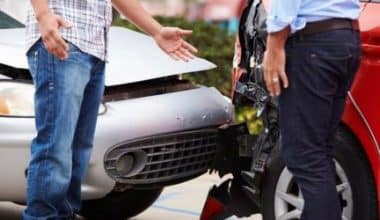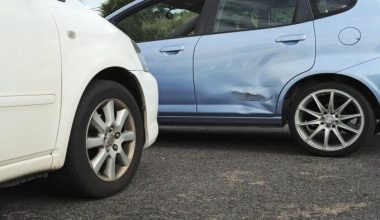Purchasing a car that has been damaged in an accident, declared salvage, and then rebuilt can appear to be a wonderful value. However, finding salvage title car insurance companies may be more difficult than finding a standard policy.
Here are some things to think about before purchasing a car with a salvage or rebuilt title, or before fixing your own destroyed car.
What is a Salvage Title?
A salvage title is given to a car when it has been so extensively damaged that the insurance company thinks it is not worth repairing. The damage could be the result of a collision, flood, or other natural disasters.
Some insurers consider a car wrecked when the cost of repairs, plus the value of the vehicle for parts, exceeds the value before the damage. Others do so at a lower level of risk. Many states have minimum criteria in their insurance rules, such as 75% or 80% of the pre-crash value.
When your car is ruled a total loss, the insurance company will pay you the pre-damage value (less the deductible), and the state’s motor vehicle office will issue a salvage certificate. When your vehicle is designated as salvage, most states prohibit you from driving it until it has been repaired and inspected.
What is a Rebuilt Title?
A rebuilt title is given to a car that had a salvage title but has since been repaired.
Many totaled cars are sold to scrap yards for parts by insurance companies. However, in other circumstances, a vehicle is restored instead — either because the insurance company sold it to a repair facility or because the owner elected to maintain and fix up the vehicle. The repaired car must pass a safety examination before the state will issue a rebuilt title.
The car’s past as a salvage vehicle is permanently recorded. This may explain why, despite their distinctions, some people use the phrases “salvage title” and “rebuilt title” interchangeably.
A rebuilt title is not available for all totaled vehicles. Some cars are so badly damaged that the state declares them “unrepairable,” which means they can only be utilized for components.
The Difference Between a Salvage and a Rebuilt Title
A salvage title is issued by the state to a car that has been declared a total loss by a car insurance company. If a vehicle with a salvage title is fixed and passes inspection, it is eligible for a rebuilt title. Keep in mind, however, that not all salvage title vehicles can be restored. In some instances, a car is declared “non-repairable,” which means it may only be used for components.
The color of the title is an easy method to tell what kind of car you have:
- Clean Title – Green
- Salvage Title – Blue
- Rebuilt Title – Orange
Salvage and Rebuilt Title Insurance
Because a salvage title car is not roadworthy, it cannot be insured. Even after it has been restored and a rebuilt title has been issued, you may have difficulty acquiring insurance. These vehicles may have concerns such as bent frames, malfunctioning electrical systems, missing airbags, or mold.
Some insurance companies may refuse to insure such automobiles or charge a higher premium to do so. Others may just give liability coverage and not comprehensive or collision coverage.
So, whether you’re considering purchasing a car with a rebuilt title or restoring your totaled vehicle, get car insurance rates from different companies. It’s a good idea to receive these quotations before you commit to buying the car in case you can’t locate the coverage you need at a reasonable price.
Before making a purchase, you should always investigate the vehicle’s history and have it thoroughly inspected by a professional.
Which Companies Provide Rebuilt or Salvage Title Insurance?
Following the repair and inspection of a car, you may be eligible to obtain salvage title insurance from the following companies:
- The American Family
- Farmers.
- Infinity.
- Kemper.
- Nationwide.
- Root.
- State Farm Insurance.
- USAA*.
*USAA insurance is only offered to active service personnel, veterans, and their families.
It should be noted that certain companies have limitations on this salvage title insurance coverage. American Family, for example, wants images of the vehicle before granting coverage, but Nationwide only gives liability insurance provided the earlier damage was solely cosmetic. In some areas, Infinity and Kemper have restrictions for safety and emissions norms. In others, they do not offer rebuilt title insurance at all.
How to Obtain Rebuilt or Salvage Title Insurance
Insuring a car with a salvage or rebuilt title is much more difficult than insuring a vehicle with a clean title. The actions listed below can help to streamline the procedure.
#1. Obtain a rebuilt title.
Remember that you cannot insure a salvage title vehicle, but you may insure a rebuilt title vehicle. If the damage is severe, your insurance company may consider your vehicle unrepairable. In this case, you will only be able to use it for components.
#2. Obtain an official mechanic’s statement.
Before attempting to insure a rebuilt car, it is critical to have a secondary check completed by a professional mechanic. This approach ensures that any substantial unresolved restoration issues are discovered early. Most insurance companies will also want a second evaluation before approving your car for road use.
#3. Determine the coverage alternatives available to you.
When looking for insurance for a car with a rebuilt title, you may have fewer possibilities. Some carriers flatly refuse to cover these vehicles. So it’s important to understand which car insurance companies cover salvage or rebuilt titles. Some carriers are cautious to give full coverage insurance to cars with rebuilt titles. This is because it is difficult to ascertain whether the damage was caused by a recent occurrence or already existed. Certain suppliers additionally charge more, resulting in a 20% higher premium.
#4. Always compare price quotes.
To locate the best coverage accessible to you, compare quotes from at least three vehicle insurance companies. This step is especially crucial when insuring a vehicle with a rebuilt title because your alternatives will most likely be limited.
Tips for Purchasing a Salvage car
If you’re considering buying a salvage car, here are a few things to think about before you do:
- When it comes to purchasing a salvage car, research your state’s individual legislation, such as lemon laws, title requirements, and insurance requirements.
- To receive thorough information on any prior damage or accidents, run the Vehicle Identification Number (VIN) via a service like CarFax.
- Hire a competent mechanic to evaluate the car and provide you with a detailed report on any damage, potential safety problems, and a repair cost estimate.
Can you file a claim on a car with a salvage title?
If you have insurance on a salvaged title car, you should be able to submit a claim in the event of an accident in the future. The insurance company’s willingness to pay out on that claim, however, is determined by the sort of coverage you selected. Most insurance companies only offer liability coverage, which does not cover physical damage to your vehicle.
If you have collision and comprehensive insurance, you should be aware that the value of your vehicle is likely to be significantly lower than that of a non-salvaged vehicle. Before filing a claim, consult with your insurance agent. This is to assess whether the claim payout is worth the repercussions of filing the claim, such as an increase in your insurance premium.
How is a Salvage Title Obtained for a Car?
When a car is declared a total loss by an insurance company but can still be repaired and certified safe to drive, it is given a salvage title. A total loss can be caused by a variety of factors, including damage from a car accident or other concerns such as fires or floods. If the vehicle’s damage exceeds its real monetary value, an insurance company will declare it a total loss. This figure is known as the total loss threshold.
Do I need to file for a rebuilt title to drive my car?
It all depends. The regulations governing salvage titles and rebuilt or repaired titles differ by state. To find out if you need to file for a rebuilt title in order to drive your salvage vehicle, contact your local Department of Motor Vehicles. Regardless of where you live, your vehicle will almost certainly need to be serviced, inspected, and insured before it can be lawfully driven on a public road.
Can I obtain full coverage for a vehicle with a salvage title?
No, you won’t be able to purchase full coverage car insurance on a vehicle with a salvage title. Most insurance companies do not provide full coverage car insurance policies on rebuilt vehicles since it is difficult to determine the actual value of the vehicle if further claims are made on it. It is, however, always a good idea to shop around for coverage and see if an insurance provider is ready to work with you, which may be an option if your car fits specific standards.
What effect does a salvage title have on insurance?
Insuring a salvage title car that has been restored is much more difficult than insuring a clean title vehicle. Some insurance companies will not issue policies for rebuilt title automobiles, while others may only offer liability insurance rather than full coverage for a salvage title car.
Is it possible to get full coverage insurance on a rebuilt title?
Maybe. It is determined by the firm and, in some situations, the sort of damage incurred by the car prior to repair. Learn more about the insurance types that are included in complete coverage.
What are the Disadvantages of a Rebuilt Title?
Aside from being more difficult to insure, a car with a rebuilt title may have hidden structural damage. Also, you may be unable to obtain financing to purchase one. According to Kelley Blue Book, its resale value may be 20% to 40% lower than that of a comparable used car with a clean title. Learn more about the dangers of salvage title vehicles.
Conclusion
If you’re thinking about purchasing a rebuilt title vehicle, make sure to check with your state’s transportation office to learn about state rules. You should also obtain a vehicle history report and have the car inspected to ensure that it was properly fixed and is safe to drive. Check with your auto insurance to determine if it covers rebuilt vehicles — or if you’ll need to locate another one.
It’s crucial to look around and compare insurance quotes when purchasing car insurance for a vehicle with a clean title. This may give you with reasonably priced options, especially if you only need liability coverage for your vehicle.
Salvage Title Insurance FAQs
What is the downside of a salvage title?
Some automobiles may have frame damage, making it extremely difficult to fix; also, the vehicle may be unable to pass a safety check and be registered in your name.
Can you insure a salvage title in Texas?
In Texas, you cannot insure or operate a car with a salvage title since salvage automobiles have been declared a total loss.
How do I change a salvage title to a clean title in Texas?
Before a standard Texas title may be awarded, the vehicle must be restored after receiving a salvage title. It is strongly advised that you save all receipts for repairs, parts, and services. After the repairs are finished, get a fresh vehicle safety inspection from a Texas Inspection Station.
- REBUILT TITLE CARS: Should you get one? (Pros & Cons)
- TITLE INSURANCE COST: How Much Does It Cost And Do You Need It?
- SALVAGE TITLE CARS: Meaning, Pros, and Cons
- CAR INSURANCE DEDUCTIBLE: How It Works
- Non-Owner Car Insurance: All You Need To Know






